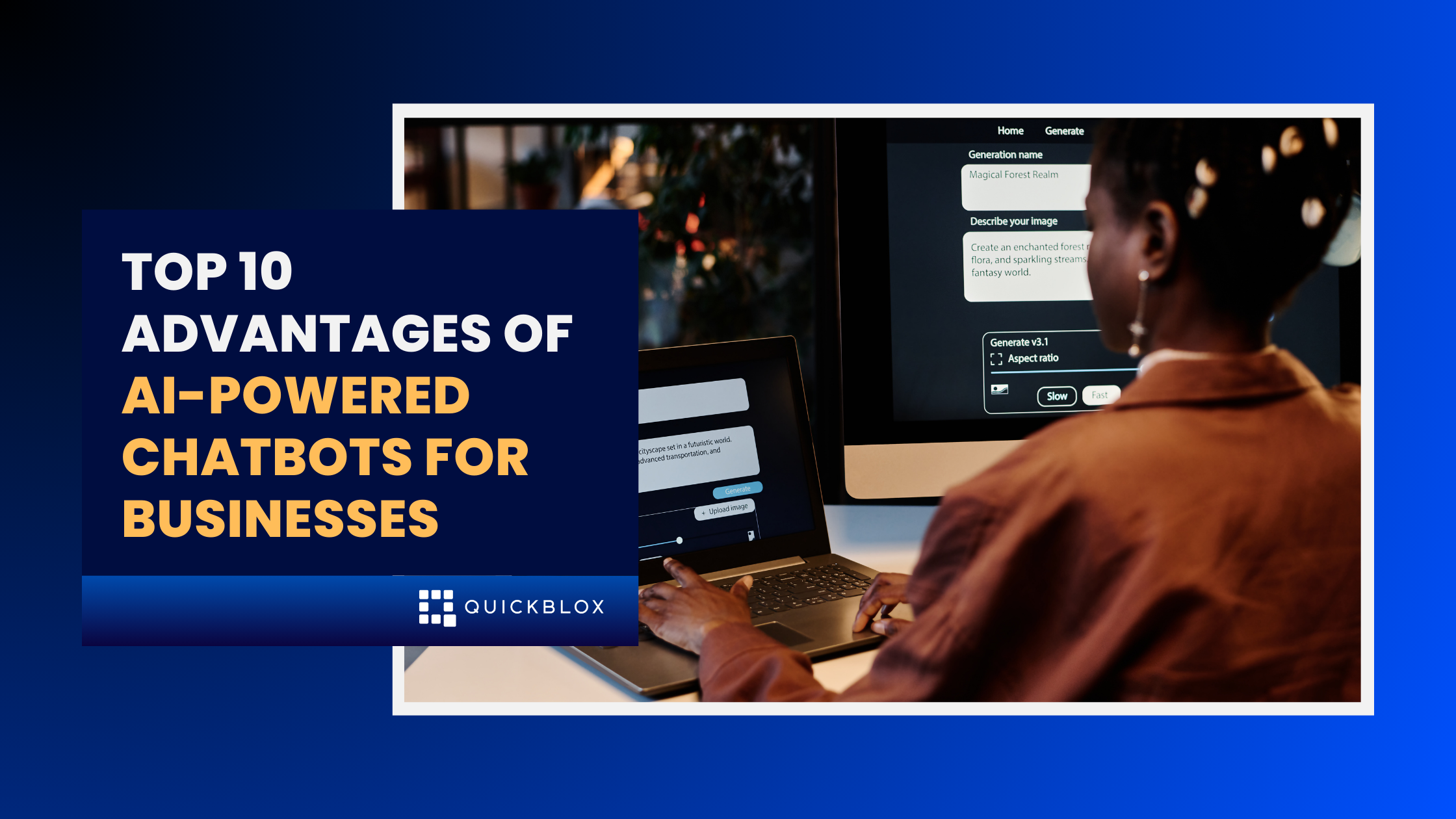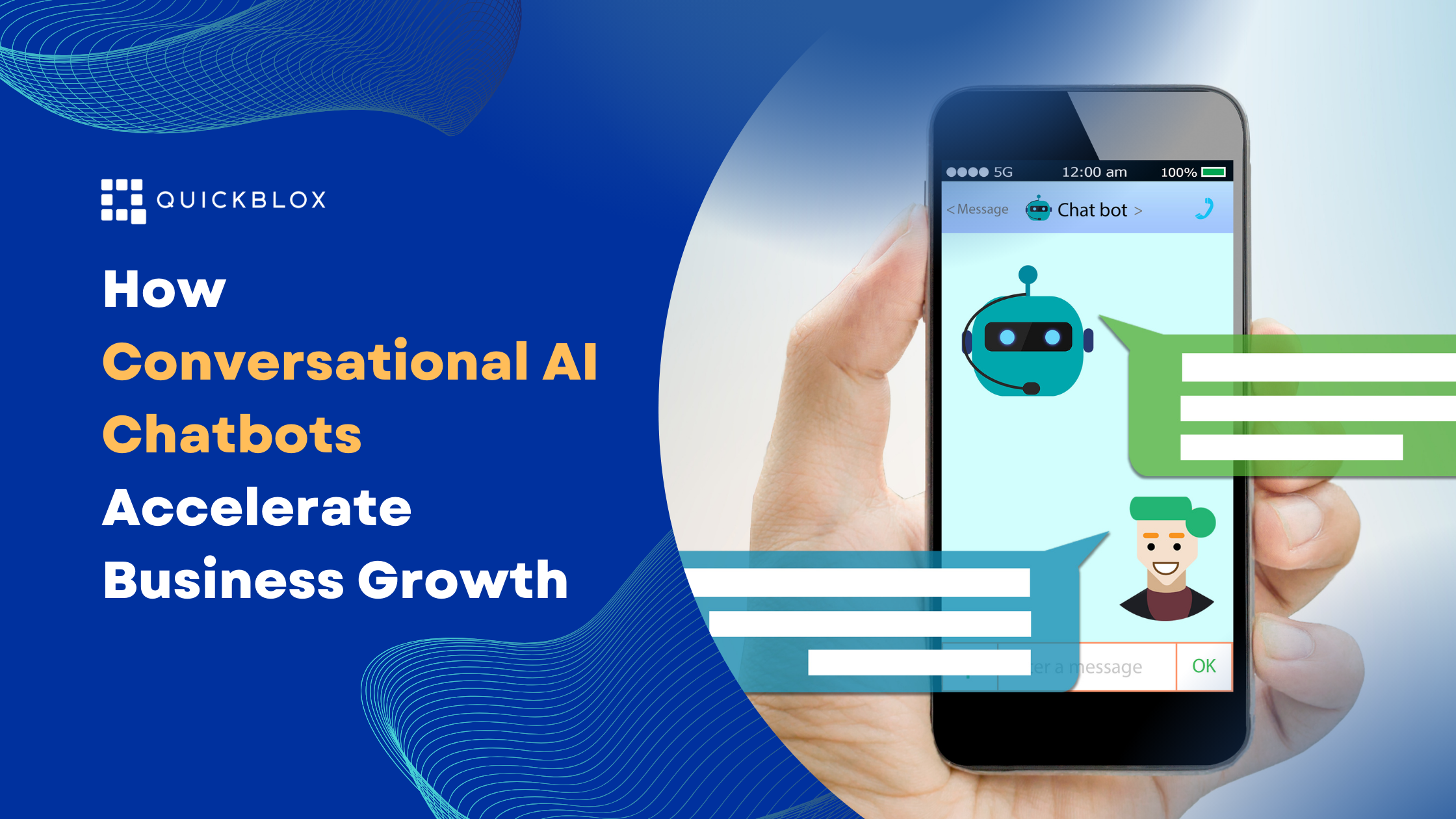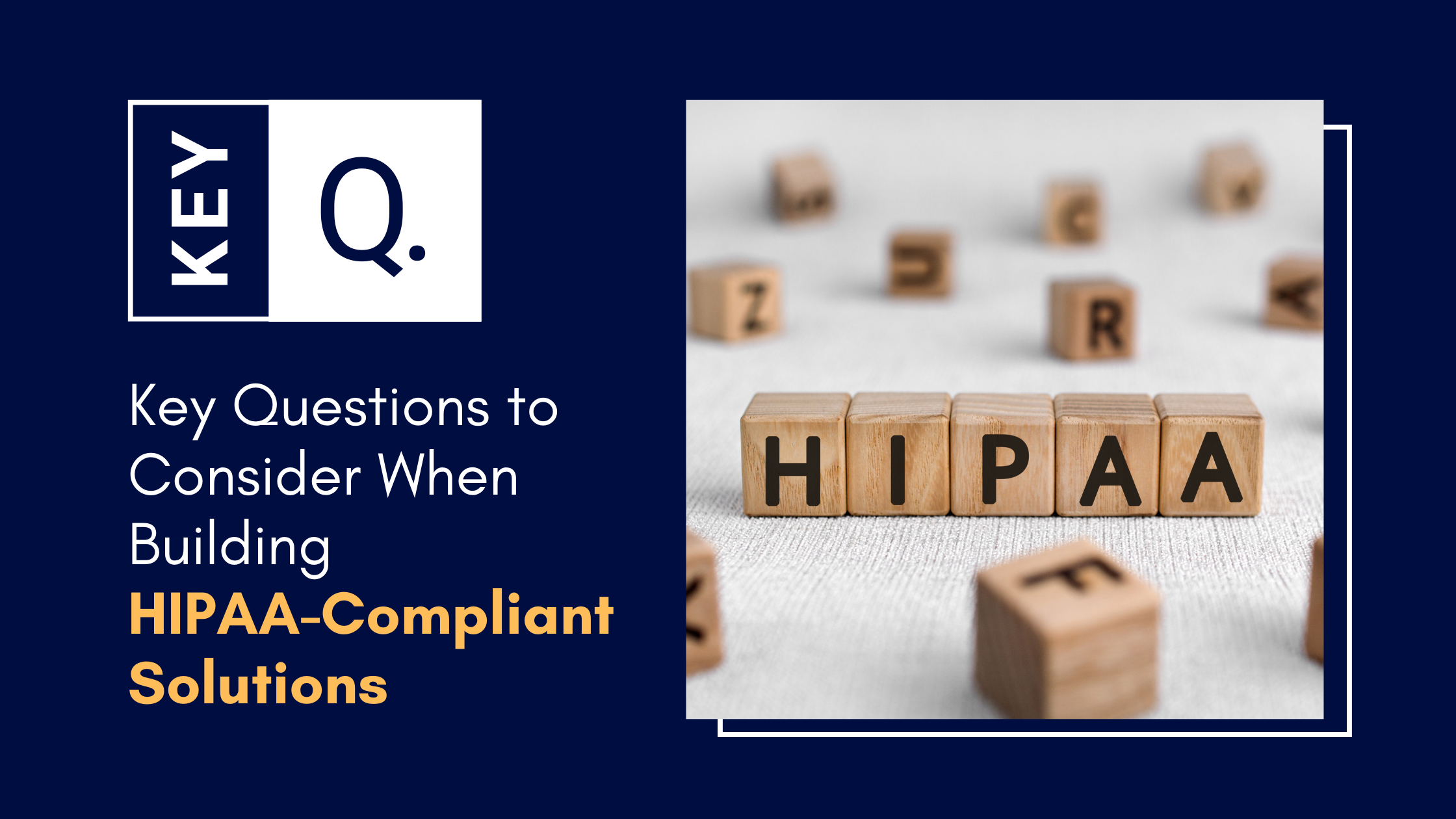
Summary: In this blog, we explain how AI chatbots are transforming business operations through 24/7 customer service, lead generation, and more. We outline key businesses benefiting from chatbots, top 10 advantages gained from using this technology, as well as offer pointers for successful AI chatbot implementation. Read on to learn how businesses are using chatbots as a digital differentiator.
Table of Contents
Introduction
In a recent Forbes article, 10 Things Every Business Leader Needs to Know About AI, the author highlights a critical reality: most businesses are already using AI—whether they realize it or not, and employees are likely experimenting with generative AI tools on their own, with or without official approval. The message to business leaders is clear—resisting AI is no longer an option. Instead, the key to success lies in embracing AI strategically. Simply “deploying AI for the sake of it” won’t help. But when adopted thoughtfully, AI can be transformative.
One of the most impactful—and accessible—applications of AI in business today is the AI-powered chatbot. These intelligent virtual agents use natural language processing (NLP) and machine learning to simulate human conversations, helping businesses streamline operations, enhance customer service, and reduce costs. They can offer a range of services from customer support and lead qualification to appointment setting and order tracking.
The market speaks for itself: the global AI chatbot industry, valued at $15.57 billion in 2025, is projected to surge to $46.64 billion by 2029. This rapid growth reflects rising customer expectations, staffing challenges, and the demand for round-the-clock, cost-effective engagement.
In this article, we’ll explore the top 10 advantages of AI-powered chatbots for businesses—and how organizations can harness them wisely to stay competitive, efficient, and responsive in a digital-first world.
Learn more about – How AI Chatbots Work: A Comprehensive Guide
Which businesses benefit from AI-powered chatbots?
AI-powered chatbots aren’t just for tech giants or Fortune 500 companies. Businesses of all sizes—from startups to enterprises—are leveraging chatbots to boost efficiency, improve customer service, and reduce costs. Here’s a look at the sectors where AI chatbots are making the biggest impact:
E-commerce & Retail
- Use Case: Product recommendation, order tracking, handling returns, and managing FAQs.
- Why It Matters: It avoids cart abandonment by involving the buyers in real-time and simplifies post-purchase service, enhancing customer satisfaction and loyalty.
Healthcare & Telemedicine
- Use Case: Scheduling of appointments, registration of patients, symptom tracking, and automating follow-up reminders.
- Why It Matters: Frees admin staff without taking a toll on HIPAA integrity. Gives patients easy access to treatment immediately without clogging up the phone line.
Finance & Banking
- Use Case: Loan pre-approval, fraud prevention, transaction request, and account maintenance.
- Why It Matters: It enhances security, eliminates traffic to the branches, and provides instant access to money data 24/7.
Travel & Hospitality
- Use Case: Real-time changes in itinerary, reservation assistance, offer support in multiple languages, and providing instant local knowledge expertise.
- Why It Matters: Reduces customer service staff workload and enhances guest experience from pre-trip to check-out.
EdTech & Education
- Use Case: Responding to enrollment questions, sharing course information, sending reminders to students, and offering resources.
- Why It Matters: Supports learners and staff around the clock, automates admin tasks, and improves engagement.
Real Estate
- Use Case: Inquiry list management, viewings coordination, and lead qualification.
- Why It Matters: Increases conversions and response, giving agents more time to make a sale.
Logistics & Delivery Services
- Use Case: Provide real-time shipment tracking, notify customers of delivery status, assist with rescheduling, check inventory, update delivery routes, and manage driver assignments.
- Why It Matters: Decreases support tickets and offers more transparency across the supply chain.
Recruitment & Human Resources
- Use Case: Scheduling candidate interviews, pre-screening candidates, and answering internal HR queries.
- Why It Matters: Reduces the recruitment process and saves HR teams from unnecessary efforts.
SaaS and Technology
- Use Case: User onboarding, support, renewals, and feature adoption.
- Why It Matters: Boosts user adoption, minimizes churn, and optimizes overall customer success.
Learn more about – The Ultimate Guide to AI Chatbot Features for Seamless Conversations
Top 10 advantages of AI chatbots for businesses
AI chatbots are not simply a technology upgrade, they are a business strategy that can generate measurable business value. The following are the top ten advantages of chatbots that companies in all industries are reaping:
1. 24/7 Customer Support
Unlike human representatives, AI chatbots never have to leave the office. They are on duty twenty-four/seven, ready to answer routine questions, troubleshoot, or alert human agents of their required involvement. This round-the-clock availability boosts customer satisfaction and allows you to never miss a customer or lead even after office hours.
2. Real-time Response Time
Customers desire immediate gratification. Chatbots eliminate the waiting component because they reply instantly, thereby improving interaction, minimizing user bounce rates, and improving user experience.
3. Cost Savings
By automating tasks like data collection, or answering standard FAQs, chatbots significantly reduce the need for large customer support teams. This means substantial savings in labor costs without sacrificing (and even improving) the quality of service. Over time, these efficiencies translate into major operational cost reductions and increased revenue through better customer engagement and higher conversion rates.
4. Scalability
No matter if you have 5 conversations or 500 to handle, AI chatbots scale seamlessly to keep up with the pace. This makes them especially helpful during peak holiday seasons, viral campaigns, or surprise spikes in traffic—responding instantly and reliably without hesitation or straining your resources.
5. Customized User Experiences
By integrating with your CRM or customer data platforms, chatbots can offer customized recommendations, recall user behavior, and lead visitors through a customized experience. This level of personalization boosts customer engagement, leading to higher customer loyalty and conversion.
6. Lead Generation & Qualification
AI chatbots, engaging with your website visitors in real time, can qualify leads through targeted questions, and collect contact details. High-quality leads can then be passed onto your sales reps, allowing them to focus on closing deals, and ultimately expanding your sales pipeline. th.
7. Automated Routine Tasks
From appointment scheduling and order processing, to reminders and updating records, AI chatbots handle monotonous, time-consuming tasks. By automating these workflows, human agents are able to spend time on more complex and high-value tasks like strategic decision-making and personalized customer interactions.
8. Omnichannel Presence
AI chatbots can be deployed across websites, mobile apps, and social messaging platforms like Facebook Messenger and WhatsApp. With the right integrations, they can also extend to voice assistants This gives you consistent, cross-channel communication wherever your customers reach out to you.
9. Actionable Analytics and Insights
Every interaction with a business-use AI chatbot is a data point. Businesses can monitor chat logs and observe what customers are doing, requesting, or complaining about. Chatbots can analyze this data and recommend changes to products, services, and processes based on their findings. In other words, AI chatbot insights offer a great opportunity to improve.
10. Multilingual Support
Serving international customers? AI chatbots with language processing capabilities can interact in multiple languages, making your business more accessible and inclusive across geographies.
Learn more about – Choosing the Right Real-Time Smartchat Assistant for Your Business
How to successfully implement an AI chatbot in your business
Now that we’ve explored the benefits of AI-powered chatbots, the next question is: how do you effectively implement one? Successful deployment requires deliberate planning and ongoing (re)assessment. Here are some key pointers to keep you on the right track.
1. Define Your Use Case
Begin by determining what you need your business AI chatbot to accomplish—customer service, lead generation, appointment setting, HR support, or something else? Your specific goals will determine what time of chatbot platform you go for and how you integrate it.
2. Choose the Right Platform
There are many chatbot platforms on the market, ranging from simple plug-and-play solutions to fully customizable SDKs and APIs. Consider your industry’s compliance needs and the level of control and customization you require.
3. Train the Chatbot with Relevant Data
To ensure that your AI chatbot truly serves your company needs, choose one that you can train on company data! Providing customer service transcripts, product documentation, knowledge base articles, and more (that are regularly updated) means your business chatbot will be able to produce accurate and relevant responses.
4. Integrate with your Existing Systems
The best chatbot seamlessly fits into your existing platforms—your CRM, helpdesk tool, e-commerce website, or messaging apps. Select the ones that are easy to install on any platform (web, mobile, social).
5. Consider Scalability
Choose a solution that will scale with your business. You can be a small business or an international company, but your business chatbot needs to be able to cope with growing amounts of interaction without affecting performance.
6. Include a Human Handover Option
Even the smartest bots can’t handle every situation. Make sure users can easily escalate to a human when needed. This ensures a seamless user experience and prevents frustration when the chatbot reaches its limits.
7. Don’t forget Analytics & Reporting Capabilities
Analytics dashboards enable you to track chatbot for business use performance, identify customer pain points, and refine your workflows in real-time on an ongoing basis.
8. Test, Learn, and Iterate
Pilot your chatbot with a small audience before going live. Monitor how it responds, where it fails, and what users are asking. Use this insight to refine its responses and functionality. Chatbots improve over time with feedback and iteration.
Learn more about – AI Chatbot Integration: A Complete Guide for Adding AI to Your Website
Conclusion
AI-driven chatbots are no longer a futuristic novelty, they’re essential business tools driving efficiency, personalization, and growth. Small and large businesses can boom in the chatbot era because of 24/7 support, cost savings, flexible interaction, and high-level analysis. If properly applied, chatbots can drive higher customer satisfaction and productivity across different corporate industries like e-commerce, banking, learning, and transportation.
If you’re looking to integrate AI into your business operations, contact the QuickBlox team. Our SmartChat Assistant can be customized to your specific workflows, integrated with your systems, and deployed securely in the cloud or on-premises. We’re here to help you. Let’s start the conversation today!
Talk to a sales expert
Learn more about our products and get your questions answered.
Contact sales
FAQs
What is an AI chatbot?
An AI chatbot is software powered by artificial intelligence—especially machine learning and natural language processing (NLP)—designed to simulate human-like conversations. These chatbots can understand user intent, respond in real time, and continuously learn from their interactions. Chatbots have widespread usage across industries like healthcare, retail, finance, and technology to automate support, facilitate routine operations, and offer personalized interaction.
How can I use a chatbot for business purposes?
There are countless ways you can use this technology for business purposes. You can use a chatbot to automate customer support, generate and qualify leads, schedule appointments, answer FAQs, process orders, and engage users across your website or messaging platforms—saving time, reducing costs, and improving customer experience.
What is the top business use of chatbots?
The most common business use of chatbots is customer support. AI chatbots handle routine inquiries, resolve issues, and provide instant assistance—reducing wait times and support costs. Other popular use cases include lead generation, appointment scheduling, order tracking, and internal helpdesk support.
How costly is a chatbot?
The cost of a chatbot varies widely depending on complexity and features, Basic chatbots can start as low as $50–$500/month, while advanced AI-powered chatbots with custom integrations may cost several thousand dollars monthly. Factors like hosting, training data, compliance (e.g., HIPAA), and support can also impact pricing. Check out QuickBlox chatbot pricing
What are the benefits of a chatbot?
The benefits of chatbots include 24/7 customer service, real-time feedback, low cost of operation, scalability during peak times, and enhanced personalization. Chatbots also help in lead generation, automating repetitive tasks, and providing actionable insights from data analytics. AI chatbots get better with experience over time, and thus they are a strategic partner to drive efficiency.








